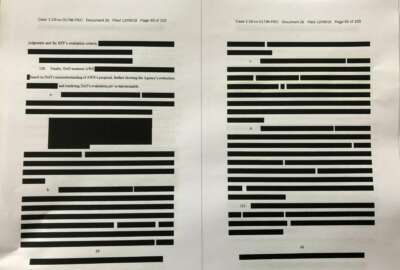This column is updated to reflect the court action granting the petition.
Pity the 24 lawyers and their squads of go-fers tied up in the Great Cloud Computing Protest shadowing the Defense Department. While you’re plucking sandwich-making scraps off the carcass of your Christmas goose and sipping eggnog, they’ll be stuck in fluorescent-lit offices, running copiers, punching holes, and assembling loose-leaf notebooks.
Two hundred thousand pages worth of notebooks, maybe more.
That’s the anticipated size of the paper version of the administrative record connected to the DOD’s $10 billion JEDI cloud procurement, last month’s award to Microsoft, and the Amazon protest thereof. The U.S. Court of Federal Claims requested a paper “courtesy” copy of the record. The electronic filing was supposed to occur today, per the court’s original order, with the paper copy due two days later.
Fat chance.
The parties — Amazon, Microsoft and the departments of Defense and Justice — have filed a poignant request for a deadline extension to January 10th. Late this morning, they got their wish, to January 3rd anyhow.
“Good cause exists to grant this motion,” they state in the petition. Those 200,000-plus pages will take the printing vendor 24-hours of continuous operation to produce. Then all those pages “must be organized into binders, tabbed, packaged, otherwise processed for delivery, and delivered.” It sounds like enough stuff to bottom out a Chevy Suburban.
The paper record, a “courtesy” its doubtful anyone will ever thumb through, merely supplements the electronic filing of the administrative record. That’s something else altogether. The court practically needs its own cloud computing contract to store it all.
As the petition spells out, besides 200,000 text pages, the record includes “a large quantity of multimedia files.” All in a variety of file types, including a 12 gigabyte video. It won’t squeeze through the connections between Defense and Justice. Nor will it fit on a single DVD. Plus, the court’s upload system has a maximum file size of 50 megabytes. Makes me wonder, what the heck is in that video?
Besides the video, the record has hundreds of PDF files. Many of them will “exceed — in some cases dramatically — the current maximum limit for a single PDF file,” the petition adds.
For its part, the government states in the filing, “The United States has worked diligently in the preceding days and weeks, and continues to work diligently, to collect and prepare the record in its entirety. More time is needed, however, to ensure all documents that are properly part of the record are collected, organized, and prepared for filing.”
Translation: We can’t handle this.
In fact, the government plans to ask for another motion for relief to establish some alternate method for uploading the records. This reminds me of hospitals having to install farm scales to accommodate those unfortunate souls whose weight exceeds the limits of regular medical scales.
It’s one thing to stuff the record through a system never designed to accommodate gigantic video files. “Given the size of the record and the coming holidays, AWS has expressed concern that a shorter extension of the time for filing the administrative record might significantly curtail its ability to fully examine the record.” The protester, Amazon, is worried about how little time it will have to review it and exercise its right to supplement it before the filing.
And you thought working in an Amazon warehouse around Christmas is hard work.
On the length of the extension, the parties therefore disagree. Amazon wants two weeks, not one, to review the administrative record. The petition states, somewhat repetitively, “Given the size of the administrative record, AWS anticipates it will require substantial effort to review the record.” It wants that January 10th request to move back to January 17th (also granted).
Substantial effort — that’s an understatement. How do you review even in two weeks a document longer than the Encyclopedia Britannica, only 10 times more boring?
Given the apparent flimsiness of the government’s own file transfer systems — as evidenced by this filing — it’s no wonder the Defense Department is pursuing cloud computing contracts.
Federal courts are apparently no better off. There’s no reason to think other than that filings will continue to grow, especially now that even surveillance video is going hi-def.
When the government sued IBM in the long, ultimately failed, antitrust case filed in 1969, IBM famously met discovery requirements with a 40-foot trailer loaded to the gills with paper. Since then, numerous federal agencies, including the courts, have installed electronic filing systems. And tinkered with them over the years. Given this single protest case probably takes up more cyberspace than all of the installed memory that existed nationwide in 1969, it’s time for an upgrade.
Copyright
© 2024 Federal News Network. All rights reserved. This website is not intended for users located within the European Economic Area.
